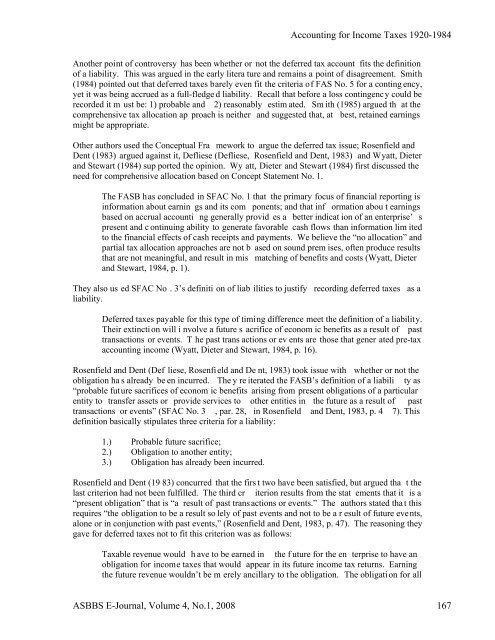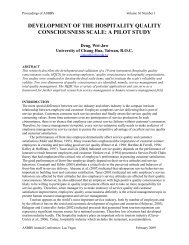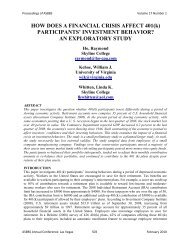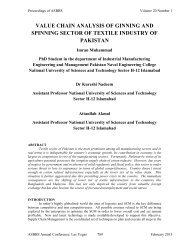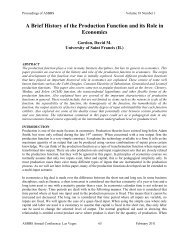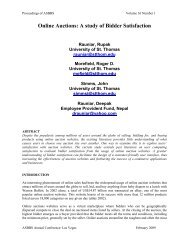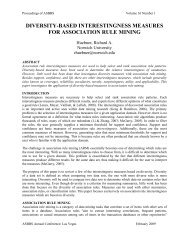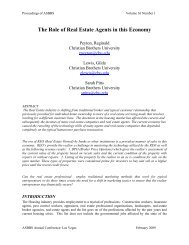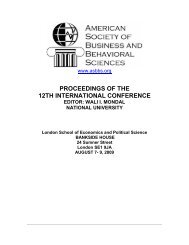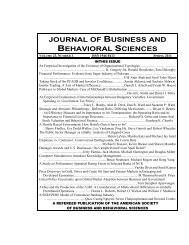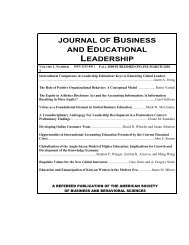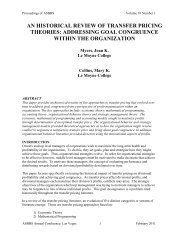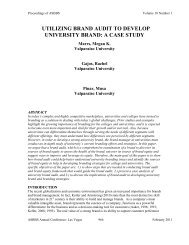stock repurchase announcements: a test of market ... - Asbbs.org
stock repurchase announcements: a test of market ... - Asbbs.org
stock repurchase announcements: a test of market ... - Asbbs.org
You also want an ePaper? Increase the reach of your titles
YUMPU automatically turns print PDFs into web optimized ePapers that Google loves.
Accounting for Income Taxes 1920-1984<br />
Another point <strong>of</strong> controversy has been whether or not the deferred tax account fits the definition<br />
<strong>of</strong> a liability. This was argued in the early litera ture and remains a point <strong>of</strong> disagreement. Smith<br />
(1984) pointed out that deferred taxes barely even fit the criteria <strong>of</strong> FAS No. 5 for a conting ency,<br />
yet it was being accrued as a full-fledge d liability. Recall that before a loss contingency could be<br />
recorded it m ust be: 1) probable and 2) reasonably estim ated. Sm ith (1985) argued th at the<br />
comprehensive tax allocation ap proach is neither and suggested that, at best, retained earnings<br />
might be appropriate.<br />
Other authors used the Conceptual Fra mework to argue the deferred tax issue; Rosenfield and<br />
Dent (1983) argued against it, Defliese (Defliese, Rosenfield and Dent, 1983) and Wyatt, Dieter<br />
and Stewart (1984) sup ported the opinion. Wy att, Dieter and Stewart (1984) first discussed the<br />
need for comprehensive allocation based on Concept Statement No. 1.<br />
The FASB has concluded in SFAC No. 1 that the primary focus <strong>of</strong> financial reporting is<br />
information about earnin gs and its com ponents; and that inf ormation abou t earnings<br />
based on accrual accounti ng generally provid es a better indicat ion <strong>of</strong> an enterprise’ s<br />
present and c ontinuing ability to generate favorable cash flows than information lim ited<br />
to the financial effects <strong>of</strong> cash receipts and payments. We believe the “no allocation” and<br />
partial tax allocation approaches are not b ased on sound prem ises, <strong>of</strong>ten produce results<br />
that are not meaningful, and result in mis matching <strong>of</strong> benefits and costs (Wyatt, Dieter<br />
and Stewart, 1984, p. 1).<br />
They also us ed SFAC No . 3’s definiti on <strong>of</strong> liab ilities to justify recording deferred taxes as a<br />
liability.<br />
Deferred taxes payable for this type <strong>of</strong> timing difference meet the definition <strong>of</strong> a liability.<br />
Their extinction will i nvolve a future s acrifice <strong>of</strong> econom ic benefits as a result <strong>of</strong> past<br />
transactions or events. T he past trans actions or ev ents are those that gener ated pre-tax<br />
accounting income (Wyatt, Dieter and Stewart, 1984, p. 16).<br />
Rosenfield and Dent (Def liese, Rosenfi eld and De nt, 1983) took issue with whether or not the<br />
obligation ha s already be en incurred. The y re iterated the FASB’s definition <strong>of</strong> a liabili ty as<br />
“probable future sacrifices <strong>of</strong> econom ic benefits arising from present obligations <strong>of</strong> a particular<br />
entity to transfer assets or provide services to other entities in the future as a result <strong>of</strong> past<br />
transactions or events” (SFAC No. 3 , par. 28, in Rosenfield and Dent, 1983, p. 4 7). This<br />
definition basically stipulates three criteria for a liability:<br />
1.) Probable future sacrifice;<br />
2.) Obligation to another entity;<br />
3.) Obligation has already been incurred.<br />
Rosenfield and Dent (19 83) concurred that the firs t two have been satisfied, but argued tha t the<br />
last criterion had not been fulfilled. The third cr iterion results from the stat ements that it is a<br />
“present obligation” that is “a result <strong>of</strong> past trans actions or events.” The authors stated tha t this<br />
requires “the obligation to be a result so lely <strong>of</strong> past events and not to be a r esult <strong>of</strong> future events,<br />
alone or in conjunction with past events,” (Rosenfield and Dent, 1983, p. 47). The reasoning they<br />
gave for deferred taxes not to fit this criterion was as follows:<br />
Taxable revenue would h ave to be earned in the f uture for the en terprise to have an<br />
obligation for income taxes that would appear in its future income tax returns. Earning<br />
the future revenue wouldn’t be m erely ancillary to the obligation. The obligation for all<br />
ASBBS E-Journal, Volume 4, No.1, 2008 167


